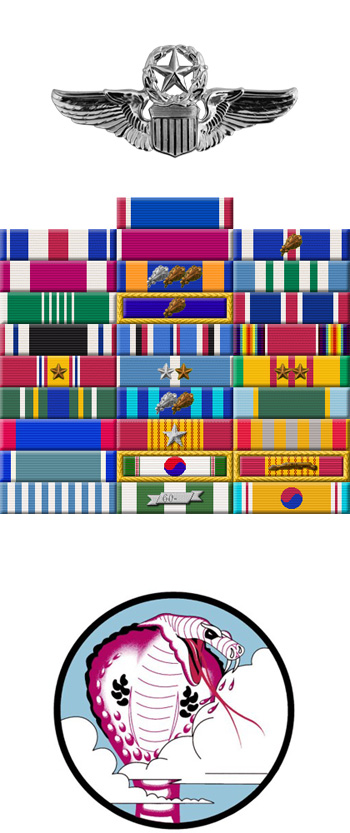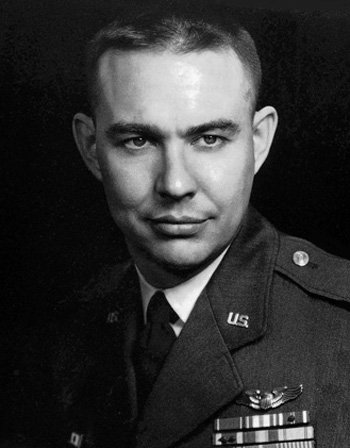
|
Harold E. Fischer |
 |
|||
| Rank, Service | ||||
Colonel O-6, U.S. Air Force |
||||
| Veteran of: | ||||
|
||||
| Tribute: | ||||
Hal Fischer was born on May 8, 1925, in Lone Rock, Iowa. He enlisted in the U.S. Navy Reserve on April 17, 1943, and entered the V-5 Aviation Cadet Program on October 8, 1943. Fischer left the V-5 program on July 10, 1944, and reverted to civilian status. He was commissioned a 2LT in the U.S. Army on February 16, 1949, and transferred to the U.S. Air Force on June 23, 1949. Fischer completed pilot training at Williams AFB, Arizona, in December 1950, and was assigned to the 80th Fighter Bomber Squadron in Korea in April 1951. He flew ground attack missions in F-80 Shooting Stars until May 1952, when he was assigned to the 41st Fighter Interceptor Squadron, flying the F-86 Sabre. He transferred to the 39th Fighter Interceptor Squadron in September 1952, and was credited with destroying 11 enemy aircraft in aerial combat, plus one probable, before he was shot down and taken as a Prisoner of War by the Chinese on April 7, 1953. He spent 784 days in captivity and was released on May 30, 1955, nearly 2 years after the Korean War ended. After his release, Fischer received an Air Force Institute of Technology (AFIT) assignment to Iowa State College. He received his degree and then remained at the college, serving as an instructor in the Air Force ROTC program there from August 1957 to August 1960. Fischer next served as a Target Analyst at Offutt AFB, Nebraska, from August 1960 to November 1961, and then as an Intelligence Officer at Ramstein AB, West Germany, until August 1962. His next assignment was as a fighter pilot with the 389th Tactical Fighter Squadron of the 366th Tactical Fighter Wing at Chaumont AB, France, where he served from August 1962 to September 1963. He then received another AFIT assignment to Oklahoma State University, where he received his PHD in February 1966. Fischer then served as a Human Factors Officer with the Test Design Division at Sandia Air Station, New Mexico, from February 1966 to August 1968. He was a research associate at the Center for International Studies at MIT from August 1968 to August 1969, and then served as a Planning and Programs Officer at Headquarters USAF at the Pentagon from August 1969 to September 1971. Col Fischer was assigned as an Air Force Advisor to the Republic of Vietnam Air Force at Bien Hoa AB, South Vietnam, from September 1971 to October 1972, and then served as Vice Commander and then Commander of the Air Force Human Resources Laboratory at Brooks AFB, Texas. Col Fischer's final assignment was at the Pentagon, where he retired from the Air Force on May 31, 1978. Hal Fischer died on April 30, 2009. |
||||
|
||||

